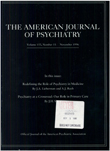Depressive distress among homosexually active African American men and women
Abstract
OBJECTIVE: Although early surveys of psychological adjustment among gay men and lesbians suggest only minor and not clinically relevant differences from heterosexual populations, concerns about psychiatric morbidity associated with HIV infection have renewed interest in the prevalence of psychological distress in this population, particularly among gay men. These later studies have focused primarily on white men. However, research indicates higher crude prevalence rates of psychological distress in community-drawn samples of African American subjects than in white subjects and also higher rates in women than in men. The authors examined rates of depressive distress and suicidal thoughts among homosexually active African American men and women who might be especially at risk for psychiatric morbidity due to multiple stigmatized social statuses. METHOD: Two nationally recruited groups of homosexually active African Americans (829 men and 603 women) completed self-administered questionnaires, including the Center for Epidemiologic Studies Depression Scale. RESULTS: Homosexually active black women were as distressed as HIV-infected gay black men. Men with symptomatic HIV disease were significantly more distressed than men who were HIV infected but asymptomatic, HIV-antibody negative, or whose HIV status was unknown. Both men and women reported distress levels in excess of those previously reported in studies of blacks or primarily white gay men. CONCLUSIONS: Further research is needed to identify specific predictors of life stressors and lack of social support among homosexually active African Americans who appear to be at higher risk for depressive distress.
Access content
To read the fulltext, please use one of the options below to sign in or purchase access.- Personal login
- Institutional Login
- Sign in via OpenAthens
- Register for access
-
Please login/register if you wish to pair your device and check access availability.
Not a subscriber?
PsychiatryOnline subscription options offer access to the DSM-5 library, books, journals, CME, and patient resources. This all-in-one virtual library provides psychiatrists and mental health professionals with key resources for diagnosis, treatment, research, and professional development.
Need more help? PsychiatryOnline Customer Service may be reached by emailing [email protected] or by calling 800-368-5777 (in the U.S.) or 703-907-7322 (outside the U.S.).



